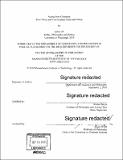| dc.contributor.advisor | Kieran Setiya. | en_US |
| dc.contributor.author | Ali, Arden | en_US |
| dc.contributor.other | Massachusetts Institute of Technology. Department of Linguistics and Philosophy. | en_US |
| dc.date.accessioned | 2017-02-22T19:03:25Z | |
| dc.date.available | 2017-02-22T19:03:25Z | |
| dc.date.copyright | 2016 | en_US |
| dc.date.issued | 2016 | en_US |
| dc.identifier.uri | http://hdl.handle.net/1721.1/107097 | |
| dc.description | Thesis: Ph. D., Massachusetts Institute of Technology, Department of Linguistics and Philosophy, 2016. | en_US |
| dc.description | Cataloged from PDF version of thesis. | en_US |
| dc.description | Includes bibliographical references (pages 87-95). | en_US |
| dc.description.abstract | This dissertation offers a theory of praise and blame: praiseworthy acts manifest virtue and blameworthy acts are incompatible with virtue. Despite its simplicity, proposals like mine have been largely ignored. After all, don't good people sometimes deserve blame, and bad people sometimes deserve praise? I believe the significance of this thought has been exaggerated. The chapters of this dissertation argue that we should understand praiseworthiness and blameworthiness by appeal to the concept of virtue, even granting the possibility of uncharacteristic behaviour. Chapter One argues against the popular view of praiseworthiness, according to which acting well requires only that the agent is moved by the right reasons and acts rightly. At its most plausible, I claim, this view employs a concept of 'acting for the right reasons' that can only be understood in relation to virtue, e.g. someone acts for the right reasons just in case she is momentarily disposed as virtue requires, or has a disposition that approximates virtue. Praiseworthy acts are manifestations of virtue, perhaps qualified in some way, but nonetheless only intelligible in virtue-theoretic terms. Chapter Two builds an account of blameworthiness. In response to puzzling cases of excuse, I distinguishfull and infallible virtue. Roughly put: full virtue requires the disposition to act well; infallible virtue involves perfect compliance with the requirements of morality. This distinction allows us to articulate the relationship between character and culpability: blameworthy acts are those incompatible with full virtue in my sense. Chapter Three addresses a conflict between my view and one dogma in the philosophy of responsibility. Philosophers usually distinguish mere badness and blameworthiness thusly: bad actions reflect deficiencies in one's ethical character but do not warrant resentment or indignation; blameworthy actions call for these attitudes. But I argue there is no privileged part of our psychology that can serve the role of 'ethical character' as it appears in the proposal. A better view falls out of the second chapter. On my view, there are two kinds of wrongdoing: those incompatible with full virtue, and those merely incompatible with infallible virtue. The former are blameworthy, but the latter are merely bad. | en_US |
| dc.description.statementofresponsibility | by Arden Ali. | en_US |
| dc.format.extent | 95 pages | en_US |
| dc.language.iso | eng | en_US |
| dc.publisher | Massachusetts Institute of Technology | en_US |
| dc.rights | MIT theses are protected by copyright. They may be viewed, downloaded, or printed from this source but further reproduction or distribution in any format is prohibited without written permission. | en_US |
| dc.rights.uri | http://dspace.mit.edu/handle/1721.1/7582 | en_US |
| dc.subject | Linguistics and Philosophy. | en_US |
| dc.title | Acting from character : how virtue and vice explain praise and blame | en_US |
| dc.title.alternative | How virtue and vice explain praise and blame. | en_US |
| dc.type | Thesis | en_US |
| dc.description.degree | Ph. D. | en_US |
| dc.contributor.department | Massachusetts Institute of Technology. Department of Linguistics and Philosophy | |
| dc.identifier.oclc | 971253999 | en_US |
